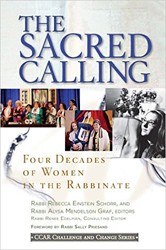
Photo by Carmine Savarese on Unsplash
It happens at least once a month: I’m walking to the subway and I find myself approached by a young man with tzitzit.
“Excuse me, are you Jewish?” he asks.
I never know how to respond. I am Jewish, yes, but I’m uncomfortable being accosted. I like to practice Judaism on my own terms rather than at a stranger’s behest.
When approached, I say that I’m too busy. Too busy to lay tefillin, or too busy to shake the lulav and etrog, or too busy to accept a free box of matzo. And yet — slight irritation in my voice aside — part of me appreciates and even depends on these tiny moments of outreach. It’s nice to know that, if I ever needed matzo, someone would offer me some. It’s nice to know that if I ever felt alone in the world, someone would tell me I still belong.
In my novel, The Men Can’t Be Saved, the main character Seth is approached on the street by a Chabad rabbi. Seth is not the kind of person who would typically pay this rabbi any mind; he’d much prefer to keep striding cockily through midtown en route to his glamorous advertising job in a Manhattan skyscraper. But when he crosses paths with the rabbi on this particular day in early spring, Seth’s recently been fired. Being Jewish is all he has left. It’s not long before he starts dining regularly at the Chabad House, reciting prayers there, studying kabbalah there, and practically making it his home. It’s a messy homecoming, but it’s a homecoming all the same. Seth’s spiritual self is evolving before our eyes.
We often talk about Jewish practices and identity as if they are a static thing. We label someone as being observant and imply that they are always engaged in Jewish traditions. Or we say that someone is not observant, suggesting that they never weave Judaism into the rhythms of their daily life. But in my experience, one’s relationship to one’s Judaism is something that ebbs and flows.
We often talk about Jewish practices and identity as if they are a static thing.
I was witness to this in my childhood home. I had just entered high school when my mom switched her affiliation from Reform to Conservative. For over a decade, my family held membership at the local Reform synagogue, but after my maternal grandmother passed away, my mother decided to become a member elsewhere. Why? She wanted to be able to say kaddish every day as part of a minyan, and the Conservative shul offered that. During those eleven months of mourning, my mom wasn’t just participating in a new ritual as part of her usual Jewish practice. She was embarking on a new practice of Judaism altogether.
And yet she never stopped being a member at the Reform synagogue either, because she knew eventually she would go back. And she did. Not too long after the mourning period ended, my mom returned to the shul of my upbringing. She had fulfilled an obligation and now felt ready to resume Judaism as she practiced it previously. Her Jewish identity proved more fluid than I’d realized.
In the process of writing my novel, I read a lot of fiction by Jewish authors and took inspiration from a variety of Jewish characters. I was especially moved by Saul Bellow’s Moses Herzog in his novel Herzog. Just as my book’s main character is in the midst of a crisis, Herzog too is spiraling, his second divorce bringing him lower than he’s ever been. It’s at this difficult stage in his life when he finds himself questioning the bedrock that was his Jewish religion: “I don’t quite understand what you mean by ‘religious’ …God comes and goes in man’s soul.”
What strikes me about this line is the inverted imagery of it. Typically one thinks of God as the fixture, whereas people are the ones coming and going. But in this formulation, it’s God who does the wandering. I like this visual because of how it humanizes God. The almighty is not immobilized up in the heavens somewhere, but ambulates down here on Earth, presumably stumbling along with the rest of us.
My novel’s title, The Men Can’t Be Saved, is rigid in tone. It sounds like a hard proclamation, the kind of thing one might find on the stiffest pages of the old testament. But I like thinking of it less as a proclamation than a challenge. What would it take for people — or men specifically — to find personal salvation during times of great adversity? And how might deepening one’s relationship with one’s faith open up certain possibilities in that effort? For my character, it’s unclear whether his Judaism will ultimately help him through this difficult period of unemployment. But at least it’s a comfort to him to know that being Jewish is something he can never lose. Even if his boss has shown him the door, there’s at least one community that will welcome him in.
Ben Purkert’s writing has appeared in The New Yorker, The Nation, Poetry, Ploughshares, Kenyon Review, Tin House, and elsewhere. His poetry collection, For the Love of Endings, was named one of Adroit’s Best Poetry Books of the Year. He holds degrees from Harvard and NYU, where he was a New York Times Fellow. He teaches creative writing at Rutgers. The Men Can’t Be Saved is his debut novel.



